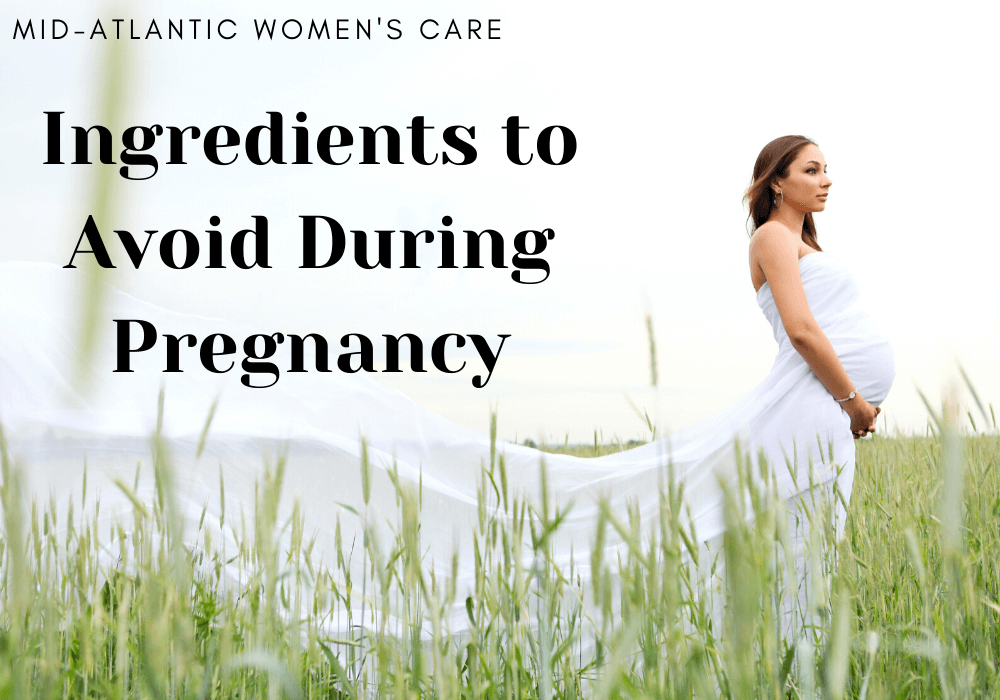Ingredients in Beauty Products You Should Avoid During Pregnancy

As people become more and more aware of the toxic ingredients often included in beauty products, making sure you know what is going into your body becomes even more important during pregnancy. We understand that it can be hard to give up a foundation, mascara, or quality skincare item that you’ve been using for years particularly when natural products just don’t seem to compare.
You’ve probably even convinced yourself that the parabens and silicones that you’re putting on your skin don’t pose any imminent danger in the short-term. But now that your choices affect the baby too, you may want to take another look at that ingredients list and educate yourself to make sure none are toxic to his or her health. Here are some ingredients that are commonly found in beauty products that you should be aware of and avoid during pregnancy.
Artificial Fragrances
Fragrances are generally made of harmful chemicals that have been linked to nervous system issues and cancer and shorter-term effects like redness and irritation on the applied area. Some companies try to hide the fact that fragrances are included by using terms like perfume, parfum, or even flavor (for more information, check out the FDA’s guidelines on fragrances in cosmetics). Most fragrance-free products are labeled as such – although some that say “unscented” contain fragrances – so opt for these options when searching for makeup, skincare, or hair care products.
BPA
You are probably aware that you aren’t supposed to microwave food in plastic dishes because the BPA from the plastic can seep into the food when heated. But did you know that BPA can infiltrate into whatever is being contained by it. This highly unstable chemical that is most commonly used in plastics can disrupt the endocrine system leading to breast/prostate cancer, infertility, heart disease, and diabetes. Fetuses that have been exposed to BPA have been linked to developmental issues, obesity, and behavioral problems.
Formaldehyde
For years, connections between exposure to formaldehyde and reproductive issues were unfounded and inconclusive. But in recent review, there has been much more evaluative evidence of an association between formaldehyde exposure and adverse reproductive and developmental effects. The chemical is a classified carcinogen and ubiquitous environmental contaminant that’s been linked to cancer as well as other nervous system issues like trouble breathing, respiratory irritations, chest pain, and coughing.
Formaldehyde is often found in some hair-straightening products and in nail polishes. During pregnancy, a trip to the salon is okay every now and then but make an effort to find a well-ventilated salon as the presence of this chemical puts your body, your baby, and salon workers at risk. If you choose to do your own nails, look for nail polishes labeled 3-free and 5-free as they don’t contain this chemical.
Parabens
Parabens are a commonly used preservative that helps to prevent the growth of mold and bacteria in all kinds of beauty products including shampoos, soaps, deodorants, makeup, and skincare. The FDA says that studies have not yet shown definitive proof that parabens are harmful to health. However, the skin can absorb parabens in lotions and cleansers and moisturizers where it then enters the bloodstream and can harm the baby. Some research has shown that exposure to parabens during pregnancy may increase the baby’s likelihood of increased weight gain in infancy and obesity in adulthood.
Hydroquinone
You’ll find this skin-lightening agent in brightening serums and creams used to treat conditions like hyperpigmentation and melasma. This is a product you should avoid using till after the baby is born because studies have shown that 45% of hydroquinone is absorbed by the skin after using it in a topical product. While no studies have shown that this has a direct effect on the fetus, too much of the chemical soaks into your bloodstream for comfort. Instead, to help prevent dark spots and discoloration during pregnancy use sunscreen…religiously!
Retinoids
Retinoids are frequently found in prescription acne and anti-aging medications like Retin-A and Accutane and have proven to be connected to an increased risk of birth defects in developing babies. We warn patients not to get pregnant if they are on these medications but if you do get pregnant, stop taking retinoids immediately.
Sulfate
You’ve probably heard many recommendations to steer clear of shampoos and soaps with sulfates, a chemical that acts as a foaming agent. Prolonged exposure to sulfates can cause issues with the nervous system and kidney and liver function. Short-term, if ingested, sulfates can cause vomiting, diarrhea, and nausea.
Phthalates
This ingredient is used to help stabilize the formulas of many moisturizers, soaps, and deodorants. But it has also been linked to liver, kidney, lung, and reproductive issues. Parabens and phthalates are endocrine-disrupting chemicals (EDC) that affect the body’s levels of reproductive hormones like estrogen and testosterone. Researchers have made connections between EDC exposure and preterm birth and hypospadias, a birth defect in the male reproductive tract in which the penis doesn’t form normally during pregnancy. Avoid all products with ingredients ending in -phthalate.
Our intention with this article isn’t to scare you but rather to be more aware of what you are putting in and on your body whether you’re pregnant or not. If you ever have questions about the safety of a product, ask your OBGYN or PCP if it’s safe for use.